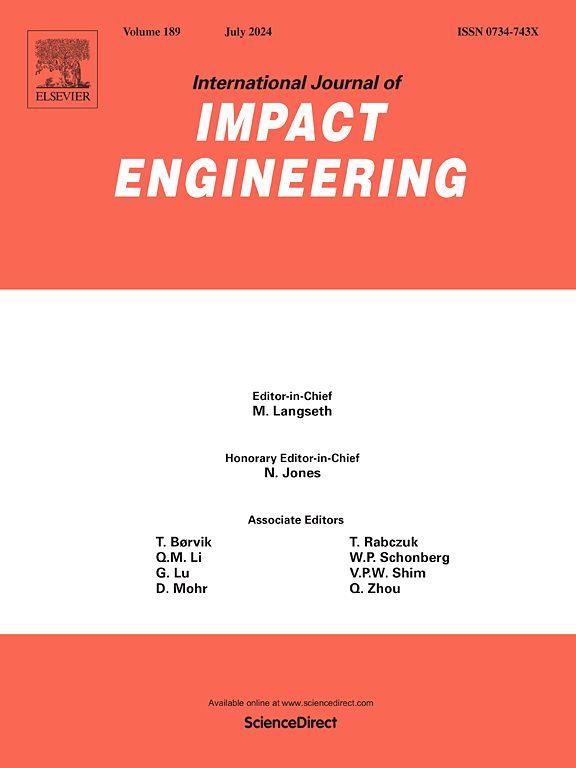Experimental and numerical study on ballistic impact behavior of explosively-welded double-layered Weldox700E targets against ogival-nosed projectiles
IF 5.1
2区 工程技术
Q1 ENGINEERING, MECHANICAL
International Journal of Impact Engineering
Pub Date : 2024-09-27
DOI:10.1016/j.ijimpeng.2024.105134
引用次数: 0
Abstract
In this work, explosive welding technique was used to fabricate 2 mm + 2 mm thick double layered Weldox700E steel targets. The bonding interface exhibited wave-shaped patterns without obvious micro-defects, grain refinement and grain elongation were observed. With specially designed shear specimen and tensile specimen, Ultimate stresses of the bonding interface under shear and tensile loadings were measured to be 526 MPa and 683 MPa, respectively. Ballistic impact tests against ogival-nosed projectiles were conducted on both explosively welded double-layered targets and double-layered contact targets. Ballistic limit velocities of the two target configurations were respectively 225.32 m/s and 203.98 m/s , with the former being 10.5 % higher than the latter. For both target configurations, localized bulging and petal-shaped cracking were observed; specially, welded bonding interface remains well bonded even after perforation of the projectile. Combining experimental results and numerical simulations, it was found that the explosively welded double-layered targets exhibited better ballistic performance than double-layered contact ones. The good welded bonding interface provides a better overall deformation capability for the explosively welded double-layered target, which is an important reason for the improved ballistic performance of the target. Although hardness tests show that there is a significant hardened layer in the explosively welded double-layered target, and the hardness value can reach up to 409.4 HV. However, the thin hardened layer cannot significantly improve the ballistic performance of the explosively welded double-layered target in the high-speed impact process of the projectile.
爆炸焊接双层 Weldox700E 靶件对口鼻弹丸弹道冲击行为的实验和数值研究
在这项工作中,采用爆炸焊接技术制造了 2 mm + 2 mm 厚的双层 Weldox700E 钢靶。焊接界面呈现波浪形图案,无明显微缺陷,观察到晶粒细化和晶粒伸长。通过专门设计的剪切试样和拉伸试样,测得粘接界面在剪切和拉伸载荷下的极限应力分别为 526 兆帕和 683 兆帕。在爆炸焊接双层靶和双层接触靶上进行了口鼻弹丸的弹道冲击试验。两种目标配置的弹道极限速度分别为 225.32 m/s 和 203.98 m/s,前者比后者高 10.5%。在这两种靶件结构中,都观察到了局部隆起和花瓣状裂纹;特别是,即使在射弹穿孔后,焊接粘接界面仍然保持良好的粘接状态。结合实验结果和数值模拟发现,爆炸焊接双层靶的弹道性能优于双层接触靶。良好的焊接结合界面为爆炸焊接双层靶提供了更好的整体变形能力,这是靶件弹道性能提高的重要原因。虽然硬度测试表明,爆炸焊接双层靶材中存在明显的硬化层,硬度值最高可达 409.4 HV。但是,在弹丸高速撞击过程中,薄硬化层并不能明显改善爆炸焊接双层靶的弹道性能。
本文章由计算机程序翻译,如有差异,请以英文原文为准。
求助全文
约1分钟内获得全文
求助全文
来源期刊

International Journal of Impact Engineering
工程技术-工程:机械
CiteScore
8.70
自引率
13.70%
发文量
241
审稿时长
52 days
期刊介绍:
The International Journal of Impact Engineering, established in 1983 publishes original research findings related to the response of structures, components and materials subjected to impact, blast and high-rate loading. Areas relevant to the journal encompass the following general topics and those associated with them:
-Behaviour and failure of structures and materials under impact and blast loading
-Systems for protection and absorption of impact and blast loading
-Terminal ballistics
-Dynamic behaviour and failure of materials including plasticity and fracture
-Stress waves
-Structural crashworthiness
-High-rate mechanical and forming processes
-Impact, blast and high-rate loading/measurement techniques and their applications
 求助内容:
求助内容: 应助结果提醒方式:
应助结果提醒方式:


